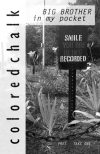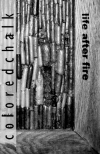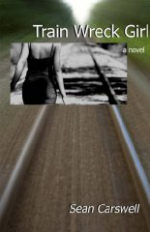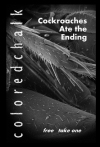"Be warned; this collection will polarize audiences, splitting readers according to their willingness to trust in an untethered voice. Sheep and Wolves does not believe in beach reading or in hammocks and hot chocolate. It does not believe in love at first sight or in happy marriages. To be happy, Sheep and Wolves says, is to embrace the absurd. “Lies are cheaper than therapy” [pg. 69]. Welcome to the bizarro fiction movement, hail Jeremy C. Shipp." [from the Oxyfication.net review of Sheep and Wolves] The following interview took place via email between 7 September 2008 and 21 September 2008. Why email? I’m afraid of the man. Your first authored book, a novel titled Vacation, was published in 2007 by Raw Dog Screaming Press. Sheep and Wolves, your follow up short story collection, is set for a December 2008 release by the same publisher. Aside from the forms themselves (short stories…
Tag Archives newsletter
Issue Four of the Colored Chalk zine has hit the virtual bookshelves. I swear, this thing just keeps getting better. And I don't say that as an ego stroke considering I am a co-editor. The proof: I had absolutely nothing to do with this issue. This issue contains some fantastic stories by Charles King, Richard Thomas, Jason Kane, Colin McKay Miller, Chris Deal, Michael A. Kechula, Gary Paul Libero, Gavin Pate, Michael Paul Gonzalez, and Tyson Estes. As always, the issue can be viewed online and can also be printed and stapled for local distribution. Call it permissible thievery. Issue Four theme: Big Brother in my Pocket: Surveillance used to be difficult. Tracking a person’s every move required a lot of legwork. Following, stalking, tracking, chasing. Exhausting. These days, you’ve got digital, got the capability to replicate every letter, every word, every sound, every pixel. Record. Upload. Share. Show everyone.…
The Colored Chalk zine once again has me at the helm, wearing the editor cap. The theme: Life After Fire Suffering an unbiased attack we are entirely reactionary. Some call this response the truest kernel of instinct and accept death with stoic certainty. Some call death the culminated answer to questions asked of gods over an entire lifetime. Yet some survive. Carrying for the rest of their lives the burden of informed choice. The following stories are those choices... This issue, I think, is out best yet. It features stories by Nik Korpon, Michael A. Kechula, Anthony David, Richard Thomas, Chris Deal, Charles King, Michael Paul Gonzalez, Joel Shoemaker, Sean P. Ferguson, Mark Grover, and Keith Haworth. Google all of them, read some of their other stories. I promise you won't be disappointed. As always, the issue can be viewed online and can also be printed and stapled for local…
Carswell, Sean, Train Wreck Girl. San Francisco: Manic D Press. 2008. paper,ISBN: 978-1-933149-21-9 Before I go any further, know that Train Wreck Girl will easily be one of the best novels of 2008. At 20 pages in, the earth paused. I remained absolutely entranced through the final page. Novels like this don’t happen very often, so pay attention. Train Wreck Girl poses as a fairly straightforward story of a man traveling cross-country to flee his past, returning years later, only to re-immerse in all that he tried to originally escape. He’s outgrown this childhood town of Cocoa Beach, FL, but only in width. The slug line describes the narrative beautifully: One man’s quest to figure out what to do with his life now that it is too late for him to die young. Beyond the immediately arresting imaginative structural elements (the first chapter is told as a countdown to New…
I've been working on a novel for the past couple years inspired by the Tom Waits song, "Hoist That Rag." This song is as close to religion as I get. Strangely, or perhaps fittingly, I don't know the literal meaning of the song. There's a guy named Piggy, something about rat addresses, and of course, as with most religions, there are crying babies involved. What this means for my novel-in-progress is that everything is simply an interpretation. Again, very fitting with religion in general. This past week I had the opportunity to experience this song live (Tulsa OK, USA, at the Brady Theater, 6.25.08). I had been looking forward to this show for months, but it wasn't until I was standing in line at the venue that I began to have reservations about hearing "Hoist That Rag" live. Until the performance my experience of the song had been entirely self-contained.…
This issue's theme spawns from the great mind of Kurt Vonnegut, via your issue two editor, Jason Heim. Vonnegut wrote: "Give your readers as much information as possible as soon as possible. To heck with suspense. Readers should have such complete understanding of what is going on, where and why, that they could finish the story themselves, should cockroaches eat the last few pages." And that's just what we aimed to do with this issue of Colored Chalk. I have a piece in this issue, "Exhibit One: A Letter From Alex Fumar," which I hesitate to mention simply because it's impact is so reliant on context. Read outside the Colored Chalk zine my piece would make absolutely no sense, and could possibly put first time readers off of my work for good. My logic is that if I called attention to "Exhibit One," then I might as well call attention…
Marketing a book in an increasingly visually driven society is a tough role. Not to mention the ever decreasing number of people who actually read (books that is, not this stupid blog). According to statistics from sources that sound legit* 80% of U.S. families did not buy or read a book last year [2002]. I'm hoping this figure can be taken literally to mean that these families did not physically purchase the book as a single group, with each member holding an edge of the book and simultaneously placing it on the bookstore counter. I would have never thought any family to do such a thing, so really the 20% of families who do is pretty eye opening. Unfortunately, the literal interpretation is a ridiculous dream. The truth is, most people simply do not read books. But don't fret my fellow 20%-ers. Veronis, Suhler & Associates investment banker** says that…






